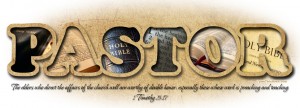Recently I was asked to share my thoughts on the role of the pastor in the church. Among other things, I explained that in the New Testament the local church had only two kinds of leaders: Elders and Deacons. And pastors fall into the category of elders.
 The New Testament is very clear that “Pastor”, “Elder” and “Overseer” refer to the same person, occupying the same position and playing the same role. These terms are translated from three different Greek words, used interchangeably. For example, 1 Peter 5:1-2 reads, “To the elders among you, I appeal as a fellow elder…. Be shepherds of God’s flock that is under your care, serving as overseers….” In Acts 20:17 Luke writes, “From Miletus, Paul sent to Ephesus for the elders of the church.” Then, in v28 Paul exhorts these elders to, “Keep watch over yourselves and all the flock of which the Holy Spirit has made you overseers. Be shepherds of the church of God….” (italics mine). I don’t think it can be any plainer than that.
The New Testament is very clear that “Pastor”, “Elder” and “Overseer” refer to the same person, occupying the same position and playing the same role. These terms are translated from three different Greek words, used interchangeably. For example, 1 Peter 5:1-2 reads, “To the elders among you, I appeal as a fellow elder…. Be shepherds of God’s flock that is under your care, serving as overseers….” In Acts 20:17 Luke writes, “From Miletus, Paul sent to Ephesus for the elders of the church.” Then, in v28 Paul exhorts these elders to, “Keep watch over yourselves and all the flock of which the Holy Spirit has made you overseers. Be shepherds of the church of God….” (italics mine). I don’t think it can be any plainer than that.
Why three different words? Simply because each term tells us something more about this very important office in the church. “Elder” underscores the maturity of the person. “Overseer” explains the person’s leadership role. “Pastor” identifies the person’s pastoral function.
Obviously, this conclusion has serious implications on church polity as it is practiced today, and including our understanding of the role of the Pastor. If the Bible teaches that Pastors and Elders are one and the same, we can’t, therefore, have Pastors in a separate category from the Elders of the church. The Pastor in a single-staff church, or the Lead Pastor in a multi-staff church, must have equal standing, authority and leadership with the other Elders. It clearly contradicts the New Testament when a person who is designated as a Pastor, carrying out the pastoral function, but does not have the leadership authority of an Elder.
If there is no intention for such a person to be part of the Eldership then it is best that he is not called “Pastor” (or “Lead/Senior/Main Pastor”). It will only lead to a lot of misunderstanding and great frustration. It is best to designate such a person as a “Ministry Staff”, or by his job title such as the “Cell Group Director”.
Furthermore, in some multi-staff churches an attempt is made to differentiate between Pastors who have the same standing with the Elders and those who do not. The former is given the designation “Pastor-Elder”. To say the least, that is an oxymoron. Something that we have conjured up to solve a problem we had created in the first place.
To add to the confusion, some churches have “lay pastors”. They are “lay” in the sense that they are not paid staff. They are given the designation “Pastor” in that they carry out pastoral ministry. However, they are not Elders of the church. The point is not that no one other than Pastors or Elders may carry out pastoral ministry. Certainly, every believer and especially the more mature ones should provide pastoral care for other members of the Body. But it does not mean that they are to be designated as Pastors. If a person is to be designated as a Pastor, then he is also an Elder.
It is gravely unfortunate that the term “Pastor” in use in many evangelical churches today is primarily about the person’s pastoral function rather than his designation. This anomaly, however, has never been the intended teaching of the New Testament.
All these problems have arisen simply because of the unbiblical differentiation we have made between “Pastor” and “Elder”. It is time that we get it right. It is time that we return to the New Testament teaching about who we call “Pastors” and their role, and also about the leadership structure of the church.